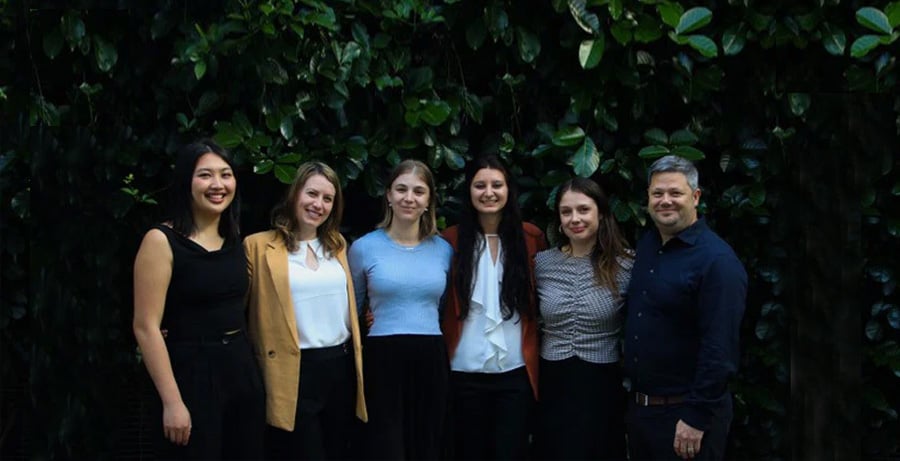What you need to help
Cultivated meat – or meat, grown in a lab using biological cells – sounds like something straight from a sci-fi novel.
Local Auckland company and BIF partner, Opo Bio Aotearoa, says the future of food is now – and it’s aiming to become one of the leading producers of cultivated meat ingredients in the world.

 |
We chatted with Dr. Olivia Ogilvie, CEO of Opo Bio, about the future of food, how to grow cellular meat and what it tastes like. |
Tell us about the origins of Opo Bio Aotearoa – how did it start?
Olivia: Laura, Vaughan and I came up with the idea for Opo during the Auckland 2021 lockdown, and founded the company in early 2022.
OpoBio was born out of an MBIE [Ministry of Business, Innovation & Employment] funded academic grant at the University of Auckland. During our academic work, we realised there was a lack of cell lines available for cultivated meat.
Cell lines are comparable to seeds, but instead of growing plants, cell lines grow tissue, and in our case, meat. Cells are the starting point for cultivating meat. So, we founded Opo to fill this critical gap in the cultivated meat supply chain.
Last July, we raised a $1.5 million seed round, and have since hired three scientists, which has increased the Opo team to six.
Growing meat in a lab sounds pretty futuristic! How does OpoBio grow meat in a lab – and can you grow different kinds of meat?
Olivia: Growing meat from cells isn’t so futuristic anymore! It's happening all around the world now, but to date, is still only made in very small scales (maybe a couple of servings).
To cultivate meat, you need four different ‘ingredients’: cells (the seeds that grow into meat), media (which is like Powerade for cells; it contains sugars, amino acids and other cell food), growth factors (signals that tell cells to grow and divide) and scaffolds (guides for cells to grab onto the outside of the animal tissue).
Once you have these four ingredients, you combine them at the perfect ratios and then put them into a bioreactor – an apparatus, which houses the biological reaction to create cellular meat, when set at the right temperature and CO2 level. This basic process allows you to grow any type of livestock meat, seafood or shellfish – you just need the starting cells from each species.
Overall, the technology to cultivate meat is still at a very early stage. For example, it's currently not possible to grow a steak, so most products are either hybrid (containing animal cells and plant protein) or unstructured (patties, meatballs). But there are significant advances being made in the field every day that’s pushing the technology forward.
The cultivated meat industry is awesome to work in, it's fast-paced and very global. The biggest misconception about cultivated meat is that it's the same as plant-based meat.
Have you taste-tested the results yet? What is it like?
Olivia: Not yet! Laura and I will taste a whole lot of different products in February though at the XPRIZE semi-finals. There are approximately 30 teams who will be presenting their products for assessment to have a shot at getting through to the finals and winning the USD$15M prize.
But, I have tasted some Perfect Day Cream Cheese made using precision fermentation – it was a different texture from animal cream cheese.

Olivia: We want to enable the capacity of cultivated meat production, so it can supply the growing global demand for food. The FAO [Food and Agriculture Organization of the United Nations] predicts that, by 2050, the world will need 70% more food to support our growing population. But we simply can’t increase the number of animals to meet this demand – there are logistical challenges, but more importantly, farming production has a significant impact on the environment.
Cultivated meat is one future food production solution that might fill this gap in a way that is less impactful on the environment than intense animal agriculture.
How big is the existing cultivated meat industry, and what is Opo Bio’s point of difference within it?
Olivia: There are around 130 companies, globally, trying to produce cultivated meat, and creating different proteins, ranging from shrimp to salmon to deer. Most of these companies are positioning themselves as manufacturers – basically, they want to develop the technology to cultivate meat, build the manufacturing plant and build a consumer brand.
We want to be the leading supplier of ingredients for cultivated meat. We’re initially focussing on cell lines, meaning we’ll offer these key ingredients to companies who are trying to manufacture and develop consumer products.
We’re the first cultivated meat company in Aotearoa but are joining some awesome other cellular agriculture companies, like Daisy Lab and Miruku who make milk proteins using precision fermentation. Cellular agriculture refers to new technologies that can make animal products (milk, meat, leather, flavours etc) using cells rather than animals.
Who or what industries have been most responsive to Opo Bio?
Olivia: Since leaving stealth mode, we’ve had a lot of interest from cultivated meat companies overseas. Access to high performing cell lines is a challenge throughout the industry, and we’ve had a really great response, which is exciting!
Do you have plans to move into plant-based meat or food?
Olivia: Our mission is to be the leader in cultivated meat ingredients. We plan to work with partners in 2023 to develop products using our cultivated cells, and some of these might contain plant proteins, but they will still be labelled as ‘cultivated products’. We’re ready for where this journey might take us.
What achievement is Opo Bio most proud of?
Olivia: Our biggest achievement of 2022 was raising our funding round! This has allowed us to really progress our technical research and development programme, and put a great team of talented scientists together to take us to the next stage.
What exciting things have you got planned next?
Olivia: We will be releasing more products for research use, including bovine fibroblasts and adipocytes. We are working on a couple of other exciting species as well, including pork and lamb.
We also want to trial our cells at larger scales, and in different ‘types’ of bioreactors. A key challenge to cultivated meat is scale. To produce enough food to feed people you need to be culturing cells on a really large scale – we need to make sure our cells are good at growing in these environments so are tackling this head on!
How has investment through Booster supported OpoBio with its goals and growth, and why did you seek local investment as opposed to offshore investment?
Olivia: We really want Opo to grow and scale operations within Aotearoa. So, it was also important for us to raise investment locally, and raise money through investors who had value to add beyond money.
Booster’s investment was an important part of our investment round. It's great to catch-up regularly with Melissa [Yiannoutsos, Booster Innovation Fund Manager] face-to-face and talk about our progression and barriers.
Booster has provided us with introductions to key people within the local ecosystem, including our awesome Independent Director, Shivali Gulab.
Share this article
We're here to help
Based in Wellington, we’re here to help you make confident money choices that grow your finances. Whether you’re saving for a first home, investing in your future or planning for retirement and more, Booster is here to help.
Call us on 0800 336 336Send us a message
Get a financial adviser
-
Read more about the Booster Innovation Fund (BIF) and some of the exciting companies it has invested in to advance early-stage innovation – and see how you can support these trailblazing companies breaking the mould right here in Aotearoa.
Booster Investment Management Limited is the issuer of the Booster Innovation Scheme, Booster Innovation Fund (Fund). The Fund’s Product Disclosure Statements are available at www.booster.co.nz or by contacting your financial adviser.
